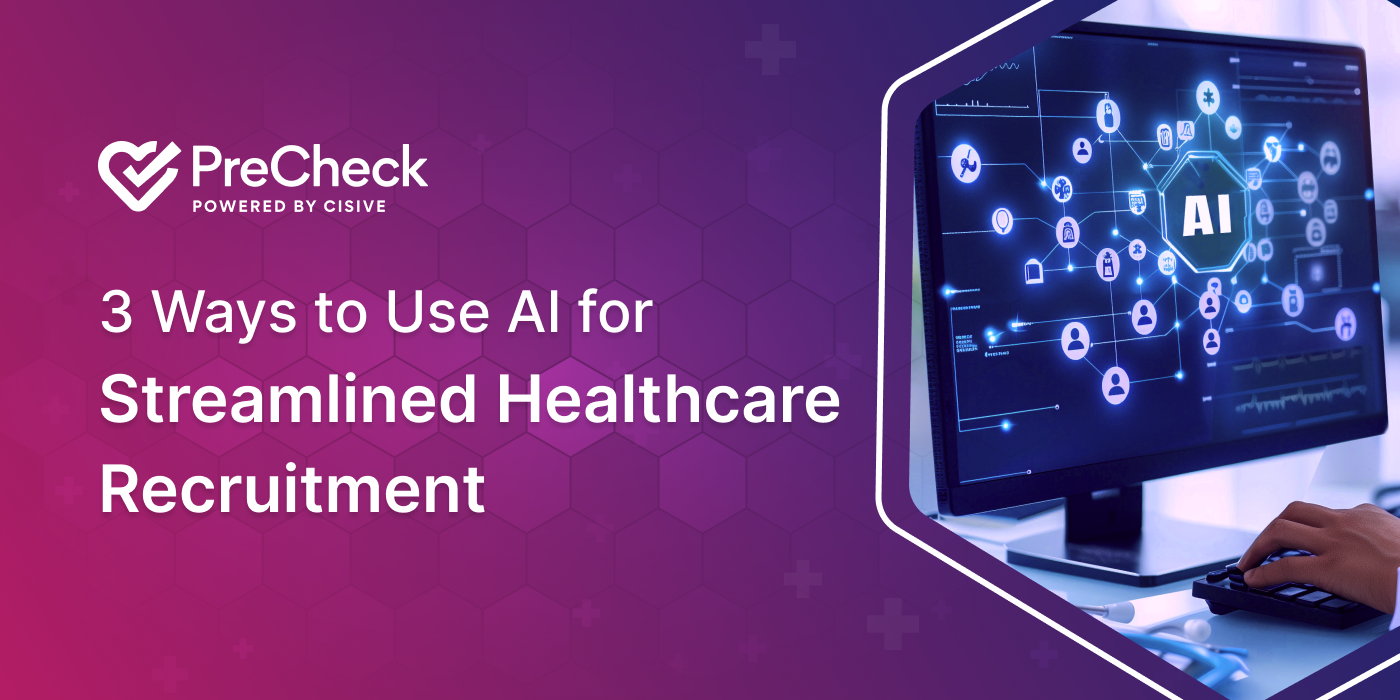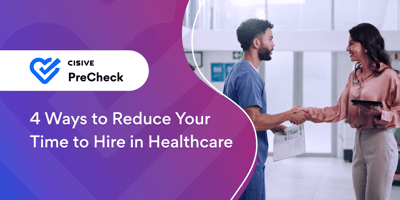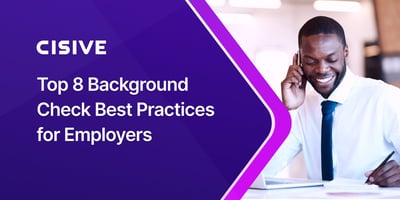

The regulatory environment for hiring compliance is only becoming more complex. In 2026, hiring...

As an HR leader in healthcare, you’re constantly juggling the urgent need to fill critical positions with the pressure of making sure each new hire is a great fit for the position. That’s why more healthcare HR leaders are using artificial intelligence (AI) in recruiting.
And the stakes are higher than ever. The Health Resources and Services Administration predicts a shortage of 68,020 primary care physicians and 337,970 registered nurses. Many organizations have already applied AI recruiting tools effectively, with top use cases being to source and engage job candidates, analyze internal recruitment data, and creating job ads and social posts for employer branding. But the potential for AI in recruiting runs much deeper, especially for healthcare organizations.
Discover how to revolutionize your recruiting process with AI. Learn how to use AI in recruiting and the benefits it can drive in your healthcare organization.
Before diving into the transformative impact of AI in healthcare recruiting, you need to understand what AI recruiting entails and how it can benefit your organization. Below, we’ll explore the foundational concepts of AI recruiting, focusing on its definition and the unique advantages it brings to healthcare.
AI recruiting is transforming the way healthcare organizations attract and hire talent. At its core, AI recruiting leverages artificial intelligence to automate and improve various aspects of the talent acquisition process. From sourcing candidates to screening resumes, AI tools handle the heavy lifting, especially in high-volume hiring situations, allowing you to focus on strategic decisions.
In healthcare, where the stakes are high, AI recruiting software holds the potential to improve efficiency and accuracy. “AI in recruiting is definitely going to help us as we start building those databases around CRMs,” says Linda Ballard, CHRO at Cisive. She foresees a future where AI recruiting tools build a pipeline of qualified job seekers right from medical and nursing schools.
Collecting more information about what each candidate wants to do and where they want to work allows you to use predictive analytics to hire more people quickly and match the right people to the right jobs.

The benefits of AI in healthcare recruiting are substantial.
With healthcare worker shortages looming large, healthcare systems can’t afford to ignore the transformative possibilities AI recruiting tools present.

Ai’s impact on healthcare recruiting goes beyond just reducing time-to-fill. It holds the potential to transform the entire hiring process from candidate sourcing to deployment. Here, we’ll discuss how AI can help automate routine tasks, improve candidate matching, and make sure that your organization stays compliant with industry standards.
In healthcare, sourcing and screening candidates often involves navigating a complex web of certifications, state regulations, and specific skill requirements. AI can automate these hiring processes, scanning multiple platforms to identify the most qualified candidates quickly. Leveraging AI to analyze candidates can help you create a more robust pipeline, Linda says.
By using AI, you can ensure that you’re not only identifying candidates who meet your technical requirements but also those who fit the specific needs of your healthcare organization, be it in acute care, home health, or hospice.
Matching the right person for the right job is important, especially in healthcare. Patient outcomes are directly affected by how well the staff performs. AI’s ability to analyze vast amounts of data means it can consider factors such as a candidate’s skills, experience, and even preferred working environments to ensure an optimal fit.
This can apply to internal candidates, too. “AI is going to open up a new world for companies in the healthcare industry,” Linda says. “They can quickly deploy internal candidates, quickly show them career paths, and support their career paths.” This enhanced matching reduces turnover and ensures that healthcare providers are staffed with professionals who are not only qualified but also motivated to excel in their roles.
Credential management in healthcare is a complex and ongoing task. Every role requires specific certifications, and maintaining compliance with state and federal regulations is non-negotiable. AI can streamline this process by automatically verifying credentials, tracking renewals, and flagging any discrepancies.
By integrating AI-enabled tools into your HRIS, you can make sure that all credentials are current and compliant, reducing the risk of legal issues and improving the quality of care provided to patients.

Creating a strong candidate pipeline is essential in healthcare recruiting, where demand for skilled professionals often outpaces supply. AI can play a pivotal role in not only identifying candidates but also nurturing relationships and predicting future staffing needs. Let’s explore how AI can help you track candidate preferences, foster community engagement, and use predictive modeling to make better hiring decisions.
Understanding the career goals and preferences of healthcare professionals is crucial to maintaining a robust candidate pipeline. AI can track these preferences, providing insights into what motivates candidates and where they see their careers heading.
By collecting information on how far a candidate is willing to travel for work, and what particular roles they’re qualified for and interested in performing, for example, you can make sure to nurture them more effectively, Linda suggests. This foresight enables proactive engagement with candidates, offering them roles that align with their career aspirations, and ensuring that your organization remains a top choice when they're ready to make a move.
Networking is essential in healthcare recruiting. Building and maintaining connections with potential candidates, even when they aren’t actively seeking a new role, is key to keeping your pipeline full. AI can help by managing these relationships. It can make sure that candidates stay connected to your company through personalized messages and job openings.
By fostering a strong network, you create a pool of candidates who are not only aware of your organization but also feel connected to it, making them more likely to apply when opportunities arise.
In healthcare, staffing needs can change rapidly due to factors like patient volume, seasonal trends, and unforeseen events. AI's predictive modeling capabilities allow you to anticipate these needs and plan accordingly. “There’s going to be a lot more predictive modeling in terms of recruiting strategies so that you can appropriately staff and serve more patients and in your community,” Linda says.
With AI, you can make sure that your healthcare organization is never caught off guard, maintaining optimal staffing levels at all times. Say, for example, that your healthcare organization is launching a new home health program in a rural area, where access to healthcare providers is limited. Predictive modeling helps you forecast staffing needs based on factors such as the projected number of patients, the average distance between patient homes, and the specific healthcare services required (e.g., physical therapy, wound care, or palliative care).
The model suggests that you’ll need a higher-than-usual number of nurses willing to travel long distances and who have experience working independently in home settings. In response, your team prioritizes hiring candidates who are not only generally qualified but also prepared to handle the unique challenges of home health care in rural areas.
Successfully integrating AI into your healthcare recruiting strategy requires careful planning and execution. It’s crucial to configure AI systems to ensure fairness, stay informed on the latest advancements, and maintain a balance between AI tools and human oversight. Below, we’ll explore these essential considerations.
The potential benefits AI offers for recruiting in healthcare are undeniable, but achieving them requires intention. “It's going to give us more data than we’ve ever had before,” Linda says. “The only caution is how you configure your system to sort that data.”
You must program your AI recruiting systems carefully to reduce biased decisions. In healthcare, where diversity and inclusion are critical, you must make sure that your AI tools are configured to promote fair and equitable candidate selection.
Regularly review and update your AI systems to ensure they reflect diverse candidate profiles and conduct audits to identify and address any biases that may arise. Work with your vendor partner to help with this process.
AI technology is rapidly evolving, and staying informed about the latest developments is crucial for maximizing its potential in healthcare recruiting. As an HR leader, it’s your responsibility to keep up with these changes and understand how they can be applied to improve your recruitment strategy.
Linda stresses the importance of staying current, not only for your own career development, but also for the good of your organization, “You do not want to fall behind when it comes to AI,” she says, “because it’s definitely moving the industry forward.” Engage in continuous education, attend industry conferences, and participate in webinars to make sure that your organization remains at the forefront of AI recruiting.
While AI can significantly enhance your hiring managers' recruitment process, it should complement rather than replace human judgment. AI is a powerful tool, but it works best when combined with the expertise and intuition of your HR team.
“I do want to put a level of caution out there with completely using AI,” she says, “where there’s no person looking through anything other than what you’ve built into your configuration.” Make sure that your recruitment team remains actively involved in the decision-making process, using AI to enhance their efforts rather than replace them. This balance will help you achieve the best recruitment outcomes, finding the right candidates while maintaining a human touch.
AI is set to revolutionize healthcare recruiting by automating processes, improving candidate matching, and promoting compliance. By embracing AI-powered tools and balancing it with human oversight, you can position your healthcare organization for success in a competitive and ever-changing landscape. Stay informed, stay proactive, and leverage the power of AI to unlock the full potential of your recruitment efforts.
Want to learn more about hiring in healthcare organizations? Schedule a call with one of our background screening experts.
Author: Jenni Gallaway
Bio: Content Marketing Manager at Cisive. 8 years of experience in the background screening industry.
Let's Connect on LinkedIn
The regulatory environment for hiring compliance is only becoming more complex. In 2026, hiring...

Recruiting and retaining talent is one of healthcare HR’s biggest challenges, especially with...

Whether you're a hiring manager or an HR professional, you need honest, reliable employees to help...